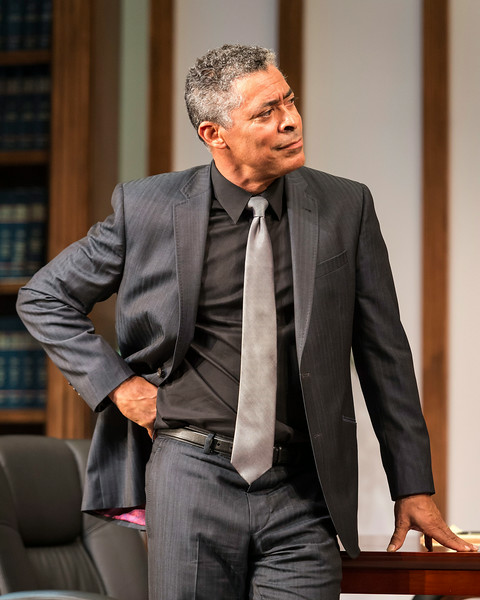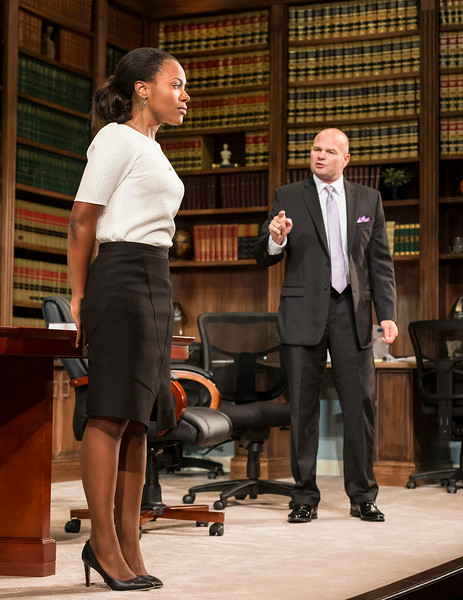David Mamet’s ‘Race’ Attempts To Tackle Complicated Issues

Jack Lawson (Chris Bauer) and his black partner Henry Brown (Dominic Hoffman) open by discussing the details of the case with the accused, Charles Strickland (Jonno Roberts), in an attempt to decide whether or not they want to serve as Strickland’s defense team. Both Lawson and Brown explain to Strickland that his case has become a media sensation because of the race of the victim and the fact that he is a rich white man. They believe that a jury will have to find him guilty due to larger cultural pressures and the fear of being labeled racist if they were to acquit. After sending Strickland out of the room, Brown and Lawson include Susan (DeWanda Wise) in their conversation as the weigh whether or not they believe Strickland is in fact guilty.
READ MORE: David Mamet's 'American Buffalo' At The Geffen Playhouse
All four actors are undeniably good at what they do. Chris Bauer plays a fearless and candid Lawson who isn’t afraid to talk about race and the realities of what it means to be black or white. Bauer walks the fine line between arrogant white privilege and remorseful white guilt as he explains the reasons for his own prejudices and admits that “there is nothing a white man can say about race that isn’t either offensive or incorrect.” Dominic Hoffman plays an equally powerful Brown, a black attorney who isn’t afraid to say what everyone else is thinking, no matter how inappropriate or downright insulting it may be. While he is on stage less so than the other actors, Jonno Roberts plays Strickland with the most depth, leaving the audience to question whether or not Strickland is in fact an innocent man. Lastly there is DeWanda Wise who plays the young, new addition to the firm, Susan. While Wise’s performance at first seems very contrived and unrealistic (some of the mistakes she makes with the case are those no Ivy-league law graduate would ever make) it becomes apparent later why she may have been so nervous and clumsy.

In terms of design, the visual elements of the show are about as stagnant as the play itself. The set (designed by Jeffery P. Eisenmann) is a cozy law office, simple and non-memorable, but it does serve its purpose. The lighting (designed by Josh Epstein) does not, and should not change, as it would be odd if the law office suddenly transformed into some dim and dramatic soap opera set. The design is simple and not distracting, as it should be, because this is a play about content over everything else— including character development, unfortunately.
Talking about race is always hard, but it is something that always needs to be done. While one can appreciate Mamet’s attempt to approach this topic in a somewhat non-traditional way, the transparency of his intention is simply too much to get past. The greatest plays always follow the “show don’t tell” rule, but unfortunately, Mamet’s "Race" is a painful 90-minutes of tell. Perhaps if Mamet would have dove deeper into the specific struggles— not just those invoking race— of each individual character, the play would have been more engaging. There is no doubt in my mind that the actors would have been able to rise to the challenge.
Reach Theater Editor Savannah L. Barker here.
"Race" in playing at the Kirk Douglas Theatre (9820 Washington Blvd., Culver City) through Sept. 28. Tickets are $25-$55. For more information visit CenterTheatreGroup.org.
For more Theater & Dance coverage click here.



